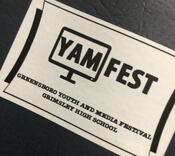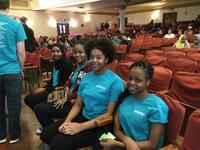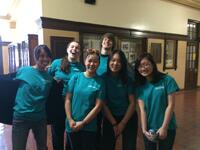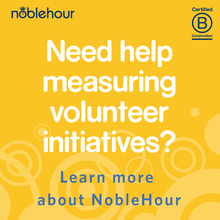
It is a normal Saturday morning and I find myself convincing my brother Mariusz to come to YAMFest with me. My methods of persuasion with a teenage boy involve promising I’ll buy him food and the opportunity to win prizes, but I’m hoping that the real reward is that he might learn something new. Reluctantly he joins me, but not without first asking, as you may be wondering also, what is YAMFest and why is it so important?
YAMFest (Youth and Media Festival) is a student-organized event at Grimsley High School in Greensboro, NC that explores how young people can better engage with technology. This past Saturday, over 350 students, educators, and members of the community attended the third annual YAMFest.
After the opening ceremony, YAMFest guests attended two sessions hosted by guest speakers from the community and by Grimsley students and organizations. For each session there were five possible presentations to attend, which covered a variety of topics: The cultural significance of hip hop and punk rock, the problems and benefits of technology use, business and marketing relationships, coding in Scratch, and using Linux.
 [Left: Students attend "Nexus between Hip Hip and Punk Rock" by Bryan Turman]
[Left: Students attend "Nexus between Hip Hip and Punk Rock" by Bryan Turman]
After these morning sessions, four student speakers from the Greater Greensboro Area shared their experiences creating feature length films, starting a photography career, and sharing their original music online. These four students represent how young people can use technology and media to become young entrepreneurs by simply sharing their interests and hobbies. A preview of a documentary by Grimsley Filmmakers Club about the Poet Laureate Project was also shown. At the beginning of the day each attendee was given a raffle ticket, and in the closing ceremony four iTunes gift cards, two selfie sticks, an iHome speaker system, and a Galexy 4 tablet were given away.
The Project Committee for YAMFest 2015 consists of 27 students from Grimsley High School. However, many other clubs, organizations, and sponsors were also involved, putting the estimate at about 100 people who helped make YAMFest a reality.

[Left: Members of the Project Committee]
The YAMFest Project Committee has two advisors at Grimsley High School, math teacher Roberta Rohan and librarian Jessica Sherard. As an educator, Rohan describes that supporting students outside of class “shows that you care about them and their other interests.” She says that, particularly in high school, each teacher will teach their favourite subject, but one of “the joys of teaching is seeingthem outside of class and supporting what they can do . . . you learn from them and you enjoy it.”
After having been involved with YAMFest as a junior, Paige Kitchen was invited to become the Project Manger in the beginning of her senior year. As a young leader, she has learned the importance of having a strong team supporting her. The Project Committee began working in August to plan the event. The day before YAMFest, she and her team were hard at work, but at no moment were they nervous. “We were all just so excited, the whole team . . . they’re so awesome,” says Kitchen.
 [Right: Paige Kitchen]
[Right: Paige Kitchen]
Students like Paige are models of how young people can make a positive impact on their community. Her advice to other young leaders is to accept that at times there will be stress, but “make sure you’re having fun during the process. Seriously, if you’re not laughing all the time and enjoying the process, then you will never be truly absorbed by it.” The most challenging part was organizing speakers for the event, Kitchen reflects. However it was worth the effort because she hopes that from these presentations her peers can gain a better understanding of technology and “hopefully be more conscious of the things they do” with technology.
YAMFest’s huge success is due to the though provoking questions it asks of Millennials. Indeed, Millennials may be the most technology-steeped generation in history, but they rarely stop to consider how technology affects our lives in many profound ways.

[Left: Members of the Project Committee]
“I just hope that people understand what we’re trying to do. We’re not some kind of boring, computer gadget museum day. No, we’re here to show you the technology that you don’t expect!” says Kitchen.
In the session entitled “Tools and Technologies: Are There Any Questions?” Muktha Jost from North Carolina A&T State University asked students to consider “how you evaluate your technology.” Technology can be both useful and dehumanizing. She described high technology such as a smartphone as the “external brain,” while low technologies, tools such as a pencil or knife, help someone develop a “craft.” She challenged students, after evaluating technology, to ask, “Taking away the external brain, what can you do?”
Music is one such “craft” that is changing in response to new technology. Gisselle Gladden, senior at Grimsley High School, describes that her favourite part of YAMFest was “learning about the technological advancements throughout the evolution of music and how today we take different approaches to discovering new music.”
[Right: Members of the Project Committee]
Sabrina Cheung, a member of the Project Committee for YAMFest, shared with me her experiences with this project. “Before, I wasn’t aware of the deep connection between youth and media. Art, music, and technology are so deeply ingrained into us. I hope that other youth can recognize this.”
YAMFest challenges young people to be self-aware of the ramifications of having an online presence, and to use their technology in the best way possible. As a regular blogger for NobleHour, I wanted to share some recent news that ties into this YAMFest mission. NobleHour.com is an example of a website used by students that is committed to a conscientious approach to young people and technology. NobleHour recently became one of 127 signatories to the Student Privacy Pledge. As a software provider to K-12 schools, NobleHour assures parents, teachers, and students that data collected from students is for the sole purpose of supporting learning opportunities and providing educational services.
After convincing my brother to attend YAMFest, Mariusz did not win any of the raffle prizes I promised him. He also complained that we didn’t order enough breakfast. I half-expected him to maintain his morning grumpiness and to hide the fact that he’d enjoyed himself. But at the end of the day, I asked him, “Mariusz did you learn anything?” and he nodded and smiled with a very enthusiastic “yes.”
Photos: Natasha Derezinski-Choo





